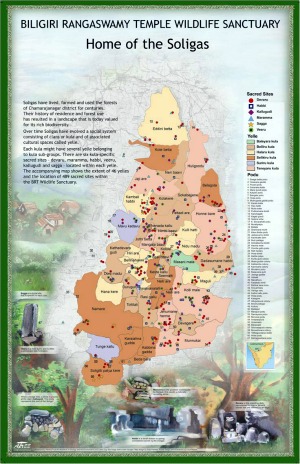Karnataka Plateau
Democratisation of water management - The experience of Tamil Nadu with governance reforms
Posted on 09 Jan, 2012 12:18 PMNor is the introduction of the private sector and the reduction in the role of the government going to help. Rather, the time has come to introduce changes at the basic or the fundamental level in the way in which the water sector functions.
There is an urgent need to bring about reforms in governance by moving towards decentralisation and democratisation, leading to involvement of people from all the sections of the society, who know and understand that they are responsible for the system and its functioning, as well as by introducing principles of equity and social justice. The papers demonstrate the successful implementation of this approach by describing the experience of Tamil Nadu at democratising water management through introduction of reforms at the level of governance, through involvement of the Tamil Nadu Water Supply and Drainage Board (TWAD).
Koodam – Breaking hierarchy, building democracy - Paper published in Integral Leadership Review
Posted on 08 Jan, 2012 03:59 PMThe paper published in the Integral Leadership Review argues that hierarchy and bureaucracy are two of the most common features of governance systems that play a determining role in shaping the organisational culture, systemic re
Trouble in Tigerland: Why conservation efforts continue to fail
Posted on 30 Nov, 2011 11:53 AMGuest Post: Nitin Rai, Ashoka Trust for Research in Ecology and the Environment (ATREE)
Drawing upon his experience working with the Soligas who live within the Biligiri Rangaswamy Temple Wildlife Sanctuary, Nitin Rai talks about the ‘wilderness’ myth and explores the origins and impacts of the belief that people and animals cannot co-exist.

Hue and cry for drinking water - Major struggle for nature’s call - A study by Udayvani and Arghyam
Posted on 22 Nov, 2011 04:32 PMThis study by Udayvani and Arghyam describes the findings of case studies undertaken by Udaywani to get a clear picture of the drinking water and toilet facilities in 8 Gram Panchayats of the 6 Districts of Karnataka following the ASHWAS survey conducted by Arghyam that included a survey of Household Water and Sanitation in 172 Gram Panchayats across 28 districts of Karnataka (all except Bangalore Urban).
Rainwater Harvesting Users and Trainers' Manual by the KUIDFC
Posted on 10 Nov, 2011 12:03 PMAdequate potable water supply to the community has become an uphill task to the administration both in rural and urban areas. This is because of dwindling groundwater sources, over-extraction, pollution of surface water bodies, negligence of fresh water bodies, poor water management, etc.
Fisheries and livelihoods in Tungabhadra basin: Current status and future possibilities – A working paper by Institute for Social and Economic Change
Posted on 30 Oct, 2011 01:02 PMThis study by Institute for Social and Economic Change (ISEC) aims at understanding the livelihood patterns of fishermen within the Tungabhadra sub basin, a tributary of river Krishna located in peninsular India. Lack of integrated approach in development initiatives and water management plans warrants the need for Integrated Water Resource Management to support livelihoods. The study focuses on fisheries as a source of livelihood, current status and institutional support available, people dependant on it, development initiatives and suggestions for improvements.
Groundwater, self-supply and poor urban dwellers - A review with case studies of Bangalore and Lusaka by IIED
Posted on 24 Aug, 2011 08:32 PMIt investigates the difficulties they face and emphasizes the need for better integration of groundwater in the planning and management of urban water resources.
Fishing crafts and gear in river Krishna - Indian Journal of Traditional Knowledge
Posted on 21 Aug, 2011 10:40 AMThis paper published in the Indian Journal of Traditional Knowledge makes an attempt to record the fisheries related indigenous technological knowledge in terms of fishing crafts and gears used in river Krishna.
"No full stops for this rainman" - Interview with Shree Padre, farmer, water journalist and rainwater harvesting "evangelist" based in Kerala (2007)
Posted on 14 Jul, 2011 10:41 AMAuthor: Namitha Dipak, Lokhit Pashu-Palak Sansthan
Shree Padre, farmer, water journalist, and rainwater harvesting “evangelist” based in Kerala, India